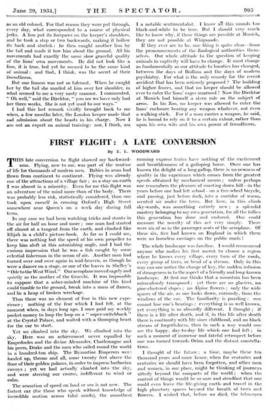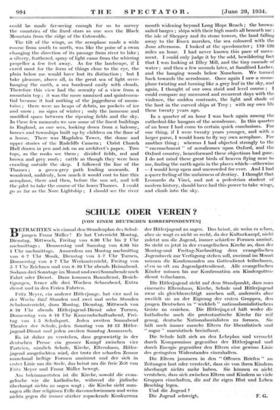FIRST FLIGHT : A LATE CONVERSION
By E. L. WOODWARD
THIS late conversion to flight showed my backward- ness. Flying, new to me, was part of the routine of life for thousands of modern men. Babies in arms had flown from continent to continent. Flying was already one of the attractions of a village fair ; as a stay-on-earth was almost in a minority. Even for me this flight was an adventure of the mind more than of the body. There was probably less risk, statistically considered, than one took upon oneself in crossing Oxford's High Street somewhere near Queen's on a week day during full term.
In any case we had been watching tricks and stunts in the air for half an hour and more ; one man had started off almost at a tangent from the earth, and climbed like Elijah in a child's picture-book. As far as I could see, there was nothing but the speed of his own propeller to keep him aloft at this astonishing angle, and I had the curious impression that he was a fish caught by some celestial fisherman in the ocean of air. Another man had turned over and over again in mid-heaven, as though he were a dancer on a stage, or one of the leaves in Shelley's " Ode to the West Wind." Our aeroplane moved sagely and quietly as the mother of the Graechi. It was impossible to suppose that a sober-minded machine of this kind could tumble to the ground, break into a mass of Raines, and lie a heap of broken wreckage.
Thus there was no element of fear in this new expe- rience ; nothing of the fear which I had felt, at the moment when, in days long ago, I once paid my weekly pocket-money to loop the loop on a " super-switchback " at the Crystal Palace, and waited with a thumping heart for the car to start.
Yet we climbed into the sky. We climbed into the Sky. Here was an achievement never equalled by Empedocles and the divine Alexander, Charlemagne and his peers, Drake and the men who sailed round the world in a hundred-ton ship. The 'Byzantine Emperors wera hauled up, throne and all, some twenty feet above the floor of their golden palaces, in order to impress barbarian envoys ; yet we had actually climbed into 'the sky, and were steering our course, indifferent to wind or calm. • The sensation of speed on land or sea is not new. The fastest car (for those who speak without knowledge of incredible motion across tidal . sands), the smoothest running express trains have nothing of the excitement and breathlessness of a galloping horse. Once one has known the delight of a long gallop, there is no newness of quality in the experience which comes from the greatest speeds obtained by mechanical means ; unless perhaps one remembers the pleasure of coasting down hill inthe years before one had-left school—on a free-wheel bicycle, and passing, just before dark, into a corridor of warm, scented air under the trees. But here, in this climb sky-wards, was something entirely new ; a splendid mastery belonging to my own generation, for all the follies this generation has done and endured. One could measure the novelty of this act very simply. There were six of us in the passenger seats of the aeroplane. Of these six, five had known an England in which there were no horseless carriages on the public roads !
The whole landscape was familiar. I would recommend anyone who makes his first ascent to choose a region where he knows every village, every turn of the roads, every group of trees, or bend of a stream. Only in this war can one notice the change of key, time sudden infusion of strangeness in to the aspect of a friendly and long-known landscape. At first one thinks that a mountain has been miraculously transposed ; yet there are no glaciers, no pine-clustered slopes ; no Alpine flowers ; only the wide spaces of the air, as one looks down, curiously, from the windows of the car. The familiarity is puzzling : one cannot lose one's bearings ; everything is so well known, yet everything is so absurdly different. I thought ; if there is a life after death, and if, in this life after death there is continuity with life since childhood, and no black stream of forgetfulness, then in such a way would one see the happy, day-to-day life which one had left ; in such a moment of immense and fateful retrospect before one was turned towards Orion and the distant constella- tions.
I thought of the future ; a time, maybe these ten thousand years and more hence, when for centuries and centuries we should have been forgotten, and other meen. and women, in our place, might. be thinking of journeys Utterly beyond the ramparts of the world ; when the control of things would be so sure and steadfast that one could even leave the life-giving earth and travel in the high planetary spaces beyond the breath of trees and flowers. I wished that, before we died, the telescopes could be --made far-seeing enough for us to survey the countries of the fixed stars as one sees the Black Mountain from the ridge of the Cotswolds.
The tilt of the wings, as the aeroplane made a wide course from south to north, was like the poise of a swan changing the direction of its passage from river to lake ; a silvery, feathered, spray of light came from the whirring propeller a few feet away. As for the landscape, if I cared most for the form of things close to the eye, the plain below me would have lost its distinction ; but I take pleasure, above all, in the great sea of light over- hanging the earth, a sea burdened easily with clouds. Therefore this view had the serenity of a view from a mountain top ; it was the more unmixed and quintessen- tial because it had nothing of the jaggedness of moun- tains ; there were no heaps of debris, no pockets of ice and snow ; no signs of winter ; only the immense and suntilled space between the ripening fields and the sky. In these few moments we saw some of the finest buildings in England, as one sees, looking down from a balcony, houses and townships built up by children on the floor of a house. There was Magdalen Tower, the dome and upper stories of the Radcliffe Camera ; Christ Church Hall drawn in pen and ink on an architect's paper. Tree tops, as the rooks see them ; divided fields, red and brown and grey roofs ; cattle as though they were bees crawling outside the skep. I followed the line of the Thames ; a green-grey path leading seawards. I wondered, suddenly, how much it would cost to hire this aeroplane, there and then, before the sun set, and tell the pilot to take the course of the lower Thames. I could go as far as the lore Lightship ; I should sec the river mouth widening beyond Long Hope Reach ; the brown- sailed barges ; ships with their high masts all beneath me ; the isle of Sheppey and its stone towers, the land falling away to the Essex marshes, the sea coloured with the June afternoon. I looked at the speedometer ; 110-120 miles an hour. I had never known this pace of move- ment. I could only judge it by the odd, bewildering fact that I was looking at Iffiey Mill, and the tiny cascade of water ; and then a few seconds later, at Sandford Lasher, and the hanging woods below Nuneham. We turned back towards the aerodrome. Once again I saw a mono- plane twisting and turning like a grey leaf in the sky, and again, I thought of our own staid and level course ; I could compare my measured and recurrent days with the violence, the sudden contrasts, the light and shade of the host in the curved ships at Troy ; with my own life these twenty years ago.
In a quarter of an hour I was back again among the cathedral-like hangars of the aerodrome. In this quartCr of an hour I had come to certain quick conclusions. For one thing, if I were twenty years younger, and with a larger purse, I would learn to fly my own aeroplane. For another thing ; whereas I had objected strongly to the " encroachment " of aerodromes upon Oxford, and the Oxford country, henceforward these objections had gone. I do not mind these great birds of heaven flying near to me, finding the earth again in the places which—otherwise —I would keep open and uncrowded for ever. And I had a queer feeling of the unfairness of destiny. I thought that Leonardo da Vinci, and not a pedestrian student of modern history, should have had this power to take wings, and climb into the sky.





































 Previous page
Previous page